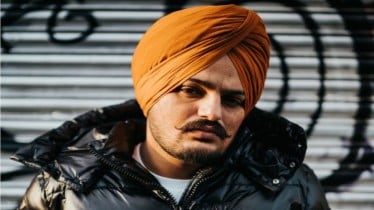By Ankur Biplav
Who killed moosewala?, written by journalist Jupinderjit Singh, is an account of what transpired on and after May 29 last year, when famous Punjabi rapper Sidhu Moosewala was shot dead by six assailants in his village while on his way to meet his aunt.
Even though a lot was written on Moosewala’s death, the author believes that all the writings were scattered, with more focus on his songs and how they dealt with gun violence.
“There were three aspects to the life of Moosewala—singer, politician and person. My book focuses on the third aspect —person,” says Singh.
Also read: THIS ‘smaller than a grain of salt’ bag costs Rs 51 lakh; here’s why
“The police were suspecting everyone. Moosewala’s father had named around 200 persons whom he suspected to be his son’s killers. No one wanted to talk,” recalls Singh.
The book gives an in-depth account of what all transpired just before Moosewala’s death and also talks about how the singer left his security personnel behind while visiting his aunt’s house. “Moosewala’s personal security guards were also suspects, as questions were raised why they didn’t go with him. Even mediapersons were under the police’s scanner,” says Singh.
During his research for the book, the author says he tried to understand Moosewala as a person and why he was embroiled in so many controversies. “Moosewala advocated that people should be given guns with proper arms licences. His reasoning was that no person with an authorised licence had ever indulged in violence,” says Singh.
While writing this book, Singh visited Moosewala’s home and was surprised to see a huge map of Punjab dating to the reign of Maharaja Ranjit Singh, who is also known as the ‘Lion Of Punjab’. “I haven’t mentioned it in the book, but that was his (Moosewala’s) dream—to have a greater Punjab. He was a nationalistic person and thus a threat to many,” says Singh.
Singh said he was surprised when he found that Moosewala was not an arrogant or outspoken person, as per popular perception.
“During my interaction with one of his friends, I was told that the rapper was rather a shy person,” says Singh.
Singh points out that as per his research, Moosewala was actually not pro-Khalistani too.
“This was evident in his popular song 295. In this particular song, Moosewala takes on those with a Kalistani ideology and calls them out for thinking themselves as ‘thekedars’ of religion. He was not pro-Khalistani; rather he actually threatened Khalistanis,” says Singh.
Talking about Punjab, Singh says there is peace in the state now, but Moosewala was seen as an anti-hero by many. “Having a huge fan following, he was automatically considered a threat,” Singh reflects on one of the many theories floating around the rapper’s killing.
Moosewala contested Punjab state elections on a Congress ticket in March 2022 but lost to Aam Aadmi Party’s Vijay Singla. Singh believes that Moosewala thought he had millions of followers so he could win an election.
“He had no political ideology. He could have contested on an AAP ticket had Bhagwant Mann approached him rightly. He was very critical of Indira Gandhi for Operation Blue Star and he also despised the Gandhis,” says Singh.
Though Singh believes that Moosewala’s songs did promote gun violence, the words he had used in his songs had a lot of history behind it. “If you understand history, then you understand a lot of things,” concludes Singh.
